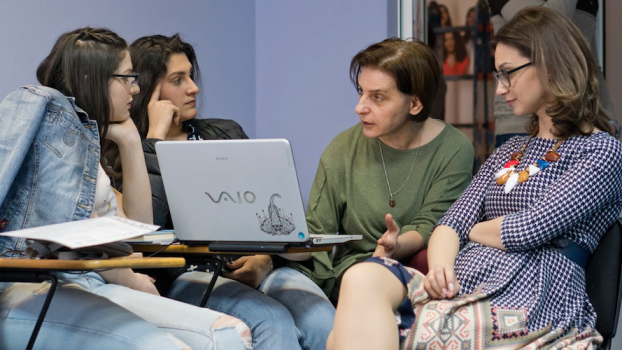Citizen Journalists: Shining a Light on Water Management in Armenia
Mane Minasyan lives in Vedi, a small town in the heart of the Ararat Valley in the west of Armenia. At 19, she is raising awareness of groundwater depletion and prompting behavior change in her community. Mane received her investigative journalism training from USAID’s Participatory Utilization and Resources Efficiency of Water (PURE Water) project, which is working to increase water productivity, efficiency, and quality in the Ararat Valley by enhancing citizen participation in water resources management. PURE Water-trained citizen journalists are empowered to investigate groundwater-related issues and voice these problems through various communication channels. To date, the project has trained 51 citizen journalists in four communities who have published more than 50 articles, reaching nearly 1,700 Armenians. Mane’s work is an example of how this training has directly contributed to improving water management in one such community.
The primary source of income for many of the 14,000 residents of Vedi is grape, apricot, and tomato production. Farms are irrigated with water from the nearby Vedi River, but due to increasingly warm summers, the water has begun to dry up between the months of July and September—a critical growth period for crops. This significant loss of water supply affects not only Vedi but the entire Ararat Valley, which is considered the breadbasket of Armenia and feeds 40 percent of the country’s population.
Water supply in Vedi and elsewhere in Armenia is managed through regional Water User Associations (WUAs), which administer irrigation water distribution to individual households and small- scale farmers. Poor oversight of the WUAs has resulted in largely unregulated irrigation water distribution. Mane explains, “There was a lot of ‘I know this person, I will give him a lot of water, I will not give [as much water to] the other one.’” Furthermore, users were uninformed. “Many people simply signed the contracts [with the WUA] without even reading what they were signing,” says Mane, and most people would pay for water without receiving a receipt. This practice led to an unequal and inefficient payment structure, a general distrust in the WUA, and reduced agricultural production.
Using the skills she obtained through the PURE Water project, Mane investigated the local WUA and published her findings on public websites, which increased awareness among Vedi’s community members and shined a light on the town’s water management practices. Not long after her findings were published, people started talking and things began to change. “Now, people go to banks to pay, and they get receipts [for the exact amount of water used],” Mane explains. Through her outreach, people “realize that the governing positions… are service providers to communities, not the opposite,” she says.
Mane explains that thanks to support from PURE Water, the people of Vedi “know there’s a journalist in their community,” which has contributed to improved water management on the part of the town’s municipal leadership. She has also inspired action among town residents. “Before, people might see an issue and just complain about it,” Mane says. “Now, they see an issue, take a picture, and send it to me. I post it on the municipality’s webpage, and there’s a response in 15 minutes or less.”
By Melissa Burnes of the USAID Communications and Knowledge Management Project
The Participatory Utilization and Resource Efficiency of Water (PURE Water) project is a three-year activity funded by USAID/Armenia and implemented by the Urban Foundation for Sustainable Development, in partnership with the Country Water Partnership NGO and Yerevan State University Environmental Law Resource Center. The goal of PURE Water is to contribute to increasing water productivity, efficiency, and quality through citizen participation, as well as to foster behavioral change to reduce the rate of groundwater extraction in the Ararat Valley in Armenia.


